Published in NEWSpirit newspaper, Summer 2023 issue.
The United Methodists of Eastern Pennsylvania and Greater New Jersey are committed to “Ending the Sin of Racism,” a clarion call answered in both conferences by some promising initiatives. They include coaching, giving grants and other support to racial-ethnic leaders and congregations, various racial learning opportunities, and efforts to grow and ensure success for cross-racial and cross-cultural ministerial appointments.
Bishop John Schol recently commended EPA and GNJ churches that “strive to deepen their understanding and commitment to end the sin of racism.” He called them “true difference makers,” in a letter he sent June 30, following the U.S. Supreme Court’s decision that outlawed Affirmative Action policies to ensure equity and diversity in higher education.
EASTERN PA CONFERENCE
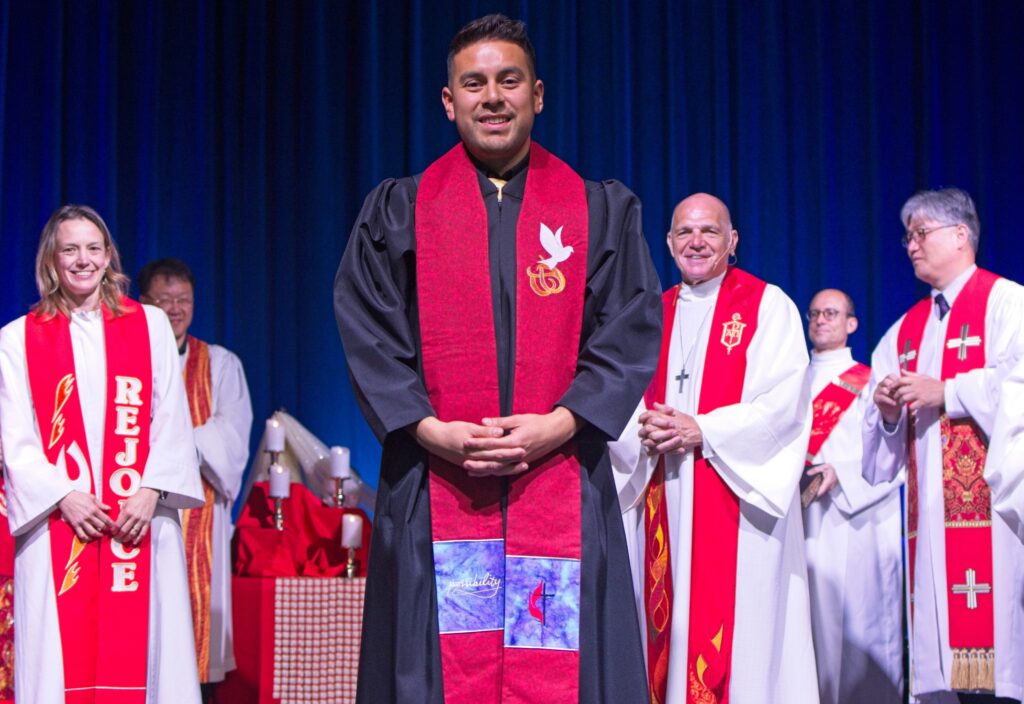
The Rev. Gabriel Lopez was one of two racial-ethnic clergy ordained at the 2023 Eastern PA Annual Conference. Corbin Payne photo
EPA is focused on at least five priorities that involve churches and clergy of color:
• Recruitment and Retention of Clergy of Color: Only one clergy member of color was ordained in 2022. But the 2023 Annual Conference ordained the Rev. Towanda Connelly, who is African-American, and the
Rev. Gabriel Lopez, who is Latino. Meanwhile, 14 more persons of color are exploring pastoral ministry
at different stages of the process—from candidacy to licensed local pastor, to preparation for ordination as deacons and elders.
• Revitalization of Racial/Ethnic Churches: Four racialethnic churches in the South-East Region (South and East districts) and one church in the North-West Region (North and West districts) are being aided in assessment and planning for mission and development through the Pathways to Congregational Fruitfulness & Health Initiative.
• Grants for African American & Ethnic Congregations: Thirty-two grants, totaling $152,123, have been given by Metro Ministries, the Urban Commission, the Latino Commission, the Congregational Development Team and Equitable Compensation.
• Reductions in Apportionments for Racial/Ethnic Churches: Twenty-three churches have received reductions of 30-45% in Connectional Ministries Fund apportionments, based on their communities’ median household income. The total reduction in their apportionments is $74,035.
• Leadership Representation: Persons of color occupy 41 percent of the top leadership roles—chairs and vice-chairs—on conference boards, councils and committees. Meanwhile, districts are urged to increase representation of laity and clergy of color, including Spanish-speaking members, among their leaders.
Leading much of this effort are the conference’s Extended Cabinet, Economic Justice Council, Board of Ordained Ministry, Committee on Leadership, Connectional Table and groups with grantmaking resources.
How does the conference help predominantly White congregations to participate in ending the sin of racism? That goal is one of the six Pathways options for churches to focus on as they seek to become more healthy and fruitful, especially those wanting to increase their ministry relationships in racially diverse communities.
Learning Opportunities for Dismantling Racism
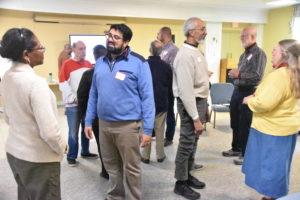
A Dismantling Racism Level II workshop on racial micro-aggressions sponsored by EPA’s Healing the Wounds of Racism Core Accountability Team. John Coleman photo
There are also learning opportunities offered in Dismantling Racism weekend workshops that are required for all clergy and lay persons serving in ordained, licensed and certified ministry. The Board of Ordained Ministry oversees the basic, twice-yearly Dismantling Racism Level I training events, which have returned to onsite, in-person gatherings.
The Healing the Wounds of Racism Core Accountability Team plans Dismantling Racism Level II workshops that address more advanced topics like racial microaggressions, congregational racial reflective audits, and the cultures and challenges of individual racial-ethnic groups in America.
The next Dismantling Racism II workshop is scheduled for Nov. 18. All Level II workshops are offered via Zoom. EPA’s Commission on Religion & Race (CORR) also provided in-depth learning opportunities via Zoom when it cosponsored with the Congregational Development Team (CDT) two monthlong, conferencewide book studies in 2021 that focused on racism in America.
The February 2021 book study explored Caste: The Origins of Our Discontents, Isabel Wilkerson’s celebrated masterpiece on America’s racial caste system that combines social analysis with compelling narratives. It was led by an interracial trio of EPA pastors. The October 2021 study of Plantation Jesus, led by co-author Andi Cumbo-Floyd and a team of CORR members, covered challenging topics related to race, ethnicity, American Christianity and cultural competence.
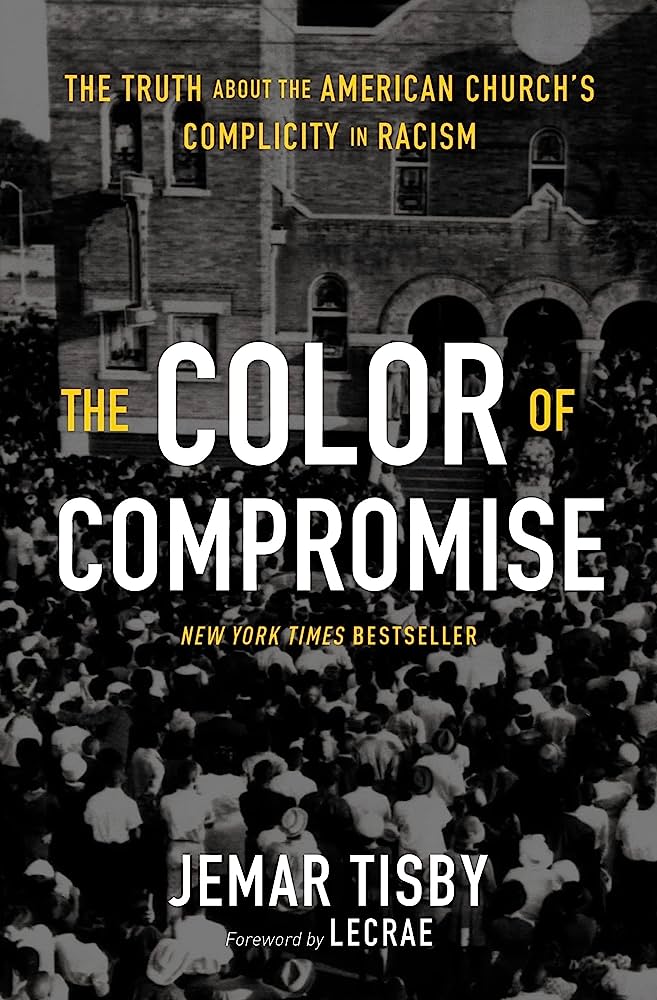
The next CDT/CORR cosponsored book study in October will focus on Jemar Tisby’s The Color of Compromise. The acclaimed work explores how people of faith historically have worked against racial justice; and it calls for an urgent response by all Christians today. Bishop Alfred Johnson, a retired clergy member of EPA and former bishop of Greater New Jersey, will lead the study. He has directed New York Theological Seminary’s Center for the Study and Practice of Urban Religion since Greater New Jersey members are invited to participate in the group study via Zoom.
CORR also sponsored a long-awaited, interracial Clergy of Color Retreat June 9-10 at Innabah Camp & Retreat Center. Attendees bonded while sharing challenges and coping strategies in their pastoral journeys, including those serving predominantly White congregations.
Cross-Racial/Cross-Cultural Ministry
But the most intensive, up-close and personal racial-ethnic learning opportunity for both clergy of color and predominantly White congregations may be the experience of Cross-Racial/Cross-Cultural (CR/CC) ministry. Members of CORR have collaborated over the past decade to develop a system of training and support for persons engaged in CR/CC ministries.. That system begins with orientation for pastors and laity new to the experience. And it extends to training and companionship for clergy and church leaders, as they forge an uncertain pathway toward interracial understanding, acceptance and cooperation.
The journey can be a lonely and tense one for many clergy in such appointments who struggle to establish mutual trust, respect and satisfaction in their pastoral relationships. But the goal is for clergy and congregation to make that risky, winding journey toward transformation together. Some do approach success, but qualified CR/CC trainers and companions are themselves carefully trained, resourced and deployed in teams to help pastors and church leaders improve their chances.
At least three biblically and socially insightful training events for CR/CC trainers and companions have occurred since last September. Plus, Bishop John Schol shared conversation over brunch with participating CR/CC pastors. And clergy and church leaders in new CR/CC appointments attended an annual training.
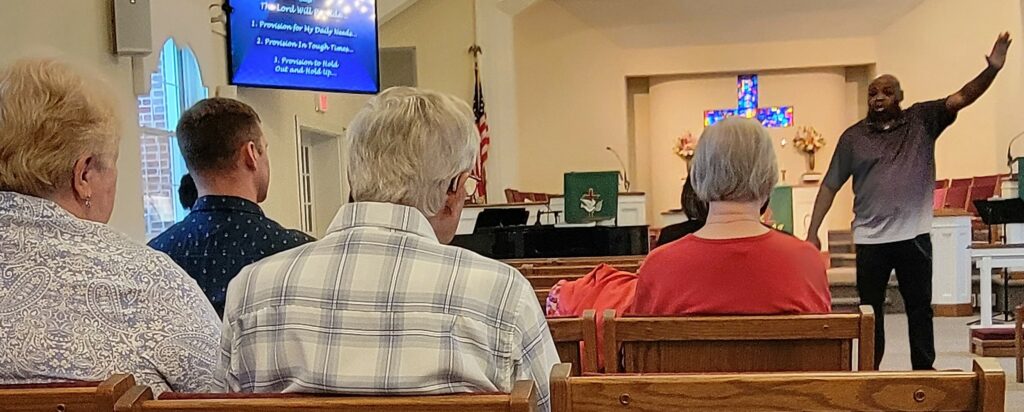
The Rev. Robert Johnson preaches at Messiah UMC in Lafayette Hill, Pa., representing his first and the church’s first cross-racial appointment. John Coleman photo
“We celebrate the promise of CR/CC Ministry and the fact that CR/CC clergy and congregations are positioned to be at the forefront of ministry in their changing communities,” said the Rev. Stacey Jones-Anderson, who helps coordinate CR/CC Companions Ministry, along with the Rev. Anita Powell. Both have led predominantly White congregations in cross-racial appointments.
Diverse Churches Among the Fastest Growing
Churches that are racially/culturally diverse are among the fastest growing in the denomination. “We challenge all of our clergy and lay members to become interculturally competent, whether or not they have CR/CC appointments,” said Powell, “because it prepares them to effectively reach, learn about and serve their diverse communities. Intercultural competency involves learning and using non-judgmental awareness of cultural differences while practicing emotional intelligence in encounters with others. It demands understanding overt, covert and internalized racism and also challenging the all-too-common implicit bias and racial microaggressions that people of color must endure.
“The reality is that this is not easy work, but God is with us in this work,” said Dennis Fisher, who coordinates CR/CC trainers along with the Rev. Beverly Andrews. “Jesus was the one who crossed all boundaries, and we are committed to going into our communities with the love of Jesus to meet all people where they are.”
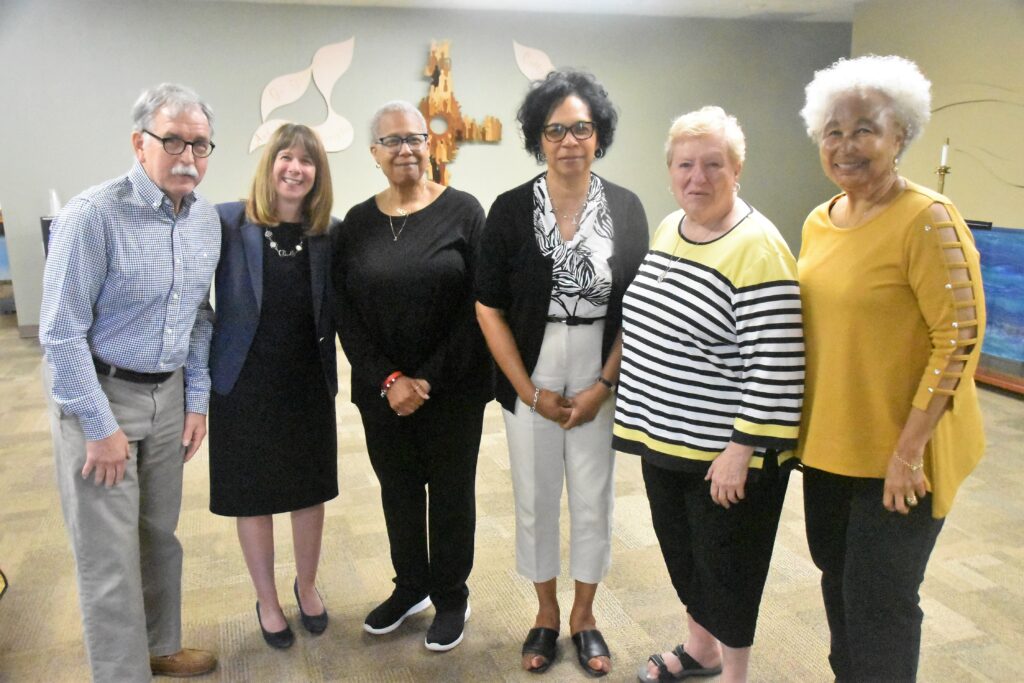
EPA CORR’s Cross-Racial/Cross-Cultural Ministry Trainers and Companions Coordinating Team met in June to discuss the future and mission of CR/CC ministry. (From left) Dennis Fisher, the Rev. Dawn Taylor-Storm, the Rev. Deborah Tanksley-Brown, the Rev. Stacey Jones-Anderson, Cynthia Lyman and the Rev. Anita Powell. John Coleman photo
Following a mid-June meeting with Bishop Schol, these CR/CC coordinators met with the Rev. Dawn
Taylor-Storm, EPA Director of Connectional Ministries, to discuss the future and mission of CR/CC ministry. They delved into the recruitment, training, deployment and support of CR/CC trainers and companions and how these efforts can interact with new EPA&GNJ strategies for training and coaching leaders through the Leadership Academy and the emerging Engage initiative.
The coordinators also asked for more involvement from district superintendents, whose crucial role is to connect pastors and laity in CR/CC appointments with CR/CC trainers and companions and to encourage them to attend CR/CC training events.
Other ideas included creating focus groups of CR/CC clergy to learn more about their needs and concerns, and increasing the visibility of CR/CC ministry while integrating it more into the vision and life of the annual conference.
GREATER NEW JERSEY CONFERENCE
Journey of Hope
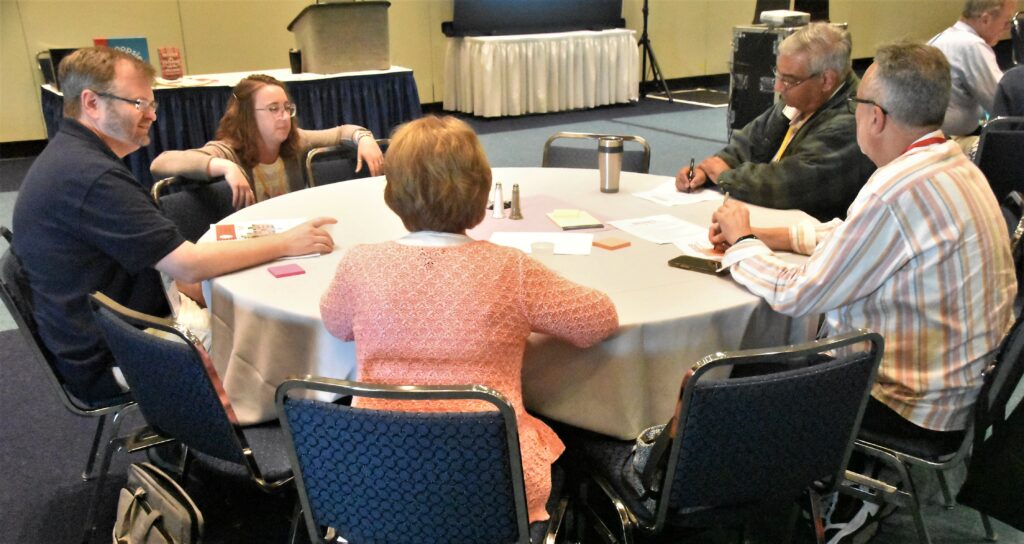
Alyssa Ruch (top-left) helps a focus group at GNJ’s Annual Conference understand the Journey of Hope Bridges Project that she directs. John Coleman photo
“GNJ enjoys great diversity, and yet has room to grow as we work together to end the sin of racism, build on past progress, and create a more just, inclusive, and equitable church and world,” writes the Rev. Ronell Howard, Central District Superintendent, in “Journey of Hope: Get In Where You Fit In” (October 11, 2022). As the former resourcing director of GNJ’s Journey of Hope initiative (JOH), she described it as a plan that “calls us to go beyond hoping for an end to racism and towards leading the charge in dismantling the systems, practices and beliefs that allow inequity and exclusion to flourish.”
The term “journey” is apt because ending the sin of racism begins with churches first assessing where they are in their understanding and commitment and then charting their course forward by engaging in anti-racism work and vital relationship-building.

GNJ is helping congregations begin that journey through the “Ending the Sin of Racism” Pathway for Fruitful and Healthy Ministry, as well as other selected Pathways. Here they can engage in facilitated, action-oriented learning that leads to cultural competency and greater vitality. Trainers have benefited from Fearless Dialogues, a resource for engaging in difficult conversations, in their preparation to work with congregations—work that will begin in the coming months.
For churches whose members don’t reflect the diversity of their community, the year-long Bridges program can help them explore the gift of diversity and missional outreach opportunities, while cultivating relationships that can span differences.
GNJ embarked on a Journey of Hope plan in 2020 to help end the sin of racism, and it recommends that churches develop their own plans. Its plan has “Keystone Measures” with timelines that include:
• Training and deploying facilitators to work with congregations on their Journey of Hope plans.
• Increasing the representation of People of Color in conference committee and agency leadership roles.
• Helping to create new racial-ethnic congregations and strengthening the worship, ministry and finances of existing congregations of color.
• Reviewing and updating GNJ’s policies and procedures to ensure that they reflect racial justice, equity and inclusion.
• Investing $4.1 million in debt forgiveness, equitable salary support and adjustments in Shared Ministry apportionments and billables for churches serving in low-income communities. Also, investing an additional $1 million for Native American sacred land/church preservation.
Making Progress Toward goals
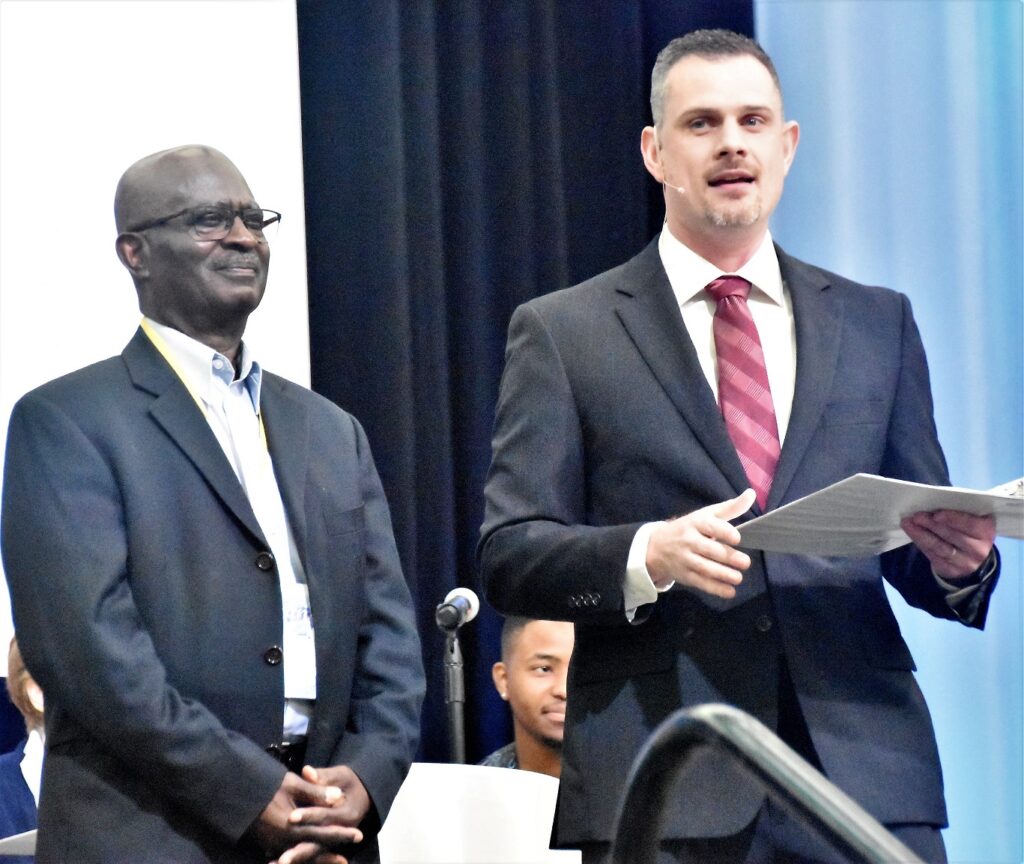
GNJ’s new Conference Lay Leader David Yamoah (left) is introduced by Connectional Ministries Director Eric Drew at the 2023 Laity Session. John Coleman photo
GNJ is making measurable progress toward those goals.
Shared Ministry apportionments and billables have been reduced for 66 qualifying congregations so far, while some congregations benefited from a one-time limited debt forbearance.
GNJ’s Implicit Bias Review Team has reviewed and sought to ensure that the language in policies and procedures, as well as Annual Conference reports, is bias-free. And the number of People of Color serving in conference committee and agency leadership roles has increased.
Moreover, GNJ launched an effort this year to help at least 25 racial-ethnic and multiracial congregations—15 African American, five Hispanic, and five Asian—strengthen their worship, ministry and finances, using strategic coaching and consultation, leadership development and financial support.
The Normalizing Next™ Cohort, an innovative first step toward that goal, provides groups of pastor/lay leadership teams with individual coaching and collective training by the Rev. Olu Brown, a successful, innovative church planter, pastor, author and coach.
Founder of the progressive, Atlanta-area Impact Church in 2007, he led it to become one of the fastest-growing churches in United Methodism with over 5,000 members active onsite and online.
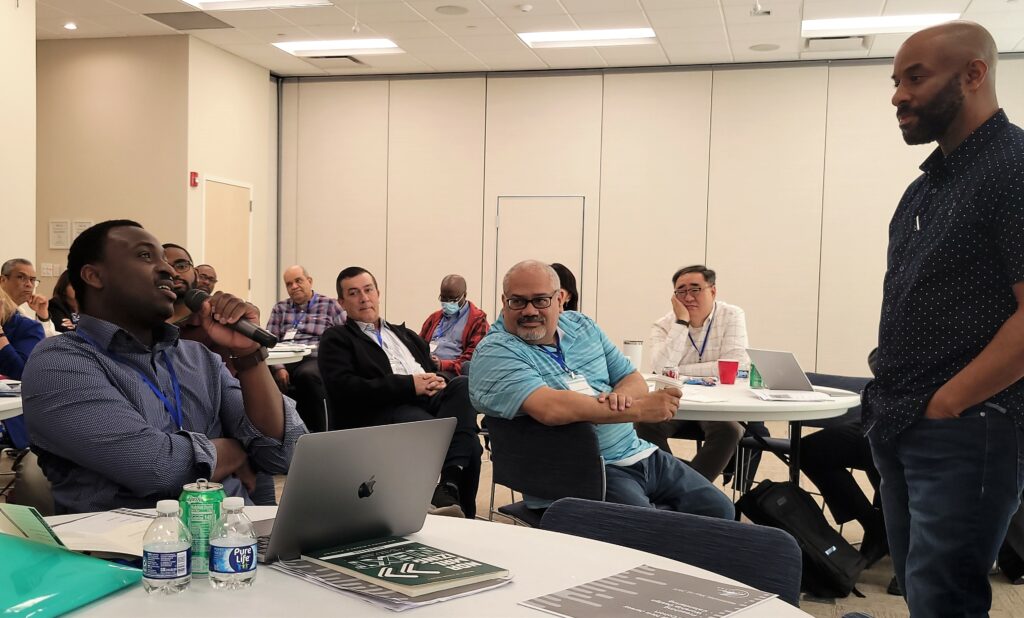
The Rev. Olu Brown (right) talks with members of GNJ’s Journey of Hope cohort about “Normalizing Next”™ strategies for enhancing worship. John Coleman photo
After pivoting during the Covid pandemic to advance Impact’s virtual and hybrid methods of
doing ministry, he retired in June 2022. He now pursues an entrepreneurial and consulting career helping churches and organizations grow leadership for their future.
Normalizing Next, a key resource for the cohort, is the title of Brown’s 2022 book that helps church leaders plan and execute strategic ministries to navigate an evolving, post-Covid social landscape. He is teaching the cohort in six, five-hour sessions from February to October at GNJ’s Mission Resource Center. Topics range from dynamic vision casting and leadership development, to growing membership and generosity, to creating impactful worship and ministries that use technology and relate to new generations that we want in our churches.
“It is important for leaders to be flexible and be able to pivot in the new era of leadership,” says Brown. “This is accomplished through simple systems and organizational design. Simplicity, not complexity, is the driving force of healthy and vital churches and organizations.”
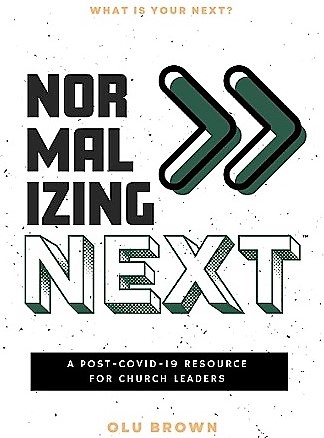
“That really spoke to me. It’s something that I’ve embraced,” said the Rev. Wayne Brown, pastor of Ferry
Avenue United Methodist Church in Camden. “My church was doing so many things, but we weren’t always doing them well. So, I’ve been sharing this concept with them to do less better. That’s what we should all be working towards.”
An implementation period will follow the six plenary sessions and individual coaching sessions, as GNJ staff facilitators help church teams to put their new wisdom to work and begin to create their “next.”
To enhance the value of this substantial investment, the conference also requires participating churches to do the Pathways congregational health and vitality assessment, guided by circuit elders and resource directors. And they may apply for congregational grants if they choose to pursue a Pathway they feel is best suited for them.

